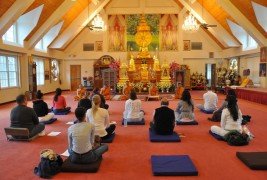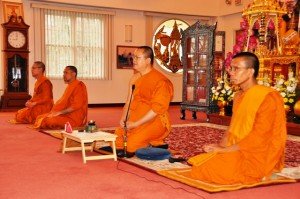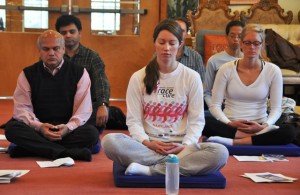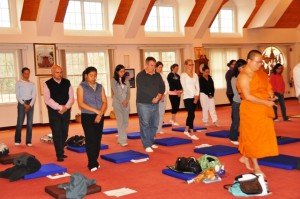Schedul of the Day
April 9, 2011
Time 09:00-09:10 Morning Chanting in Pali
Time 09:10-09:30 Introduction to Meditation & Dhamma Talk by Phra Ajahn Dr. Thanat Atthacharee
Time 09:30-10:40 Guide Meditation by Phra Ajahn Dr. Thanat (15 minutes sitting, 15 minutes walking, short break, 15 minutes sitting, 15 mins walking)
Time 10:40-10:50 Questions and Answers session.
Time 10:50-11:00 Sharing Metta Loving kindness
Introduction to basic meditation
Good morning Dhamma friends
Meditation focuses on maintaining quietness of our busy mind. The effect is to direct our concentration to one healing element – one sound, one word, one image, or one’s breath. When our mind is “filled” with the feeling of calm and peace, it cannot take off on its own and worry, stress out or get depressed.
The meditative state allows our nerves and tired muscles to relax, calm heart rates and ease blood pressure. The effect is so restful and peaceful that you will look forward to do it daily.
How Does Meditation Work?
Studies have shown that meditation can bring about a healthy state of relaxation by causing a generalized reduction in multiple physiological and biochemical markers, such as deceased heart rate, decreased respiration rate, decreased plasma cortisol, decreased pulse rate and increased EEG alpha, a brain wave associated with relaxation. Our body gains a state of pr! ! ! ofound rest.
During meditation, our blood pressure stays at “low level” but falls significantly for persons on medication with abnormally high levels of blood pressure.
Meditation reduces activity in the nervous system. Through meditation we can learn to access the relaxation response and to be aware of the mind and the way our attitudes produce stress. In calming the mind, meditation can also put one in touch with the inner physician, allowing our body’s own inner wisdom to be heard.
Meditation is part of my yoga practice. When I meditate, I feel my life changes for the better. It brings me peace of mind and I handle things better in life. I have the insights I want to solve problems and a clearer viewpoint even when I feel stressful. Through all these years of practicing meditation, I have been able to reap the positive influence on my life.
How To Meditate Effectively?
Ideally you should meditate in a quiet place, or a room with no ! di! st! raction. Wear simple and comfortable clothes and remov! e yo! ur s! hoes when meditate. Try meditating in the same place every time because that will build up a calm meditative energy, making it easier each time to go within.
Guide to Meditation:-
1. Sit upright on your meditation mat with legs folded. You may find this rather uncomfortable at the start, but after a few attempts you will get use to it.
2. Straighten up your spine and close your eyes.
3. Using both your thumb and forefinger touching each other, place your hands on your knees, one on top of the other.
4. Take three full breaths through your nose, filling up your lower diaphragm and slowly letting it out, again through the nose.
5. Repeat your breath, always through the nose, feeling your breath go in and go out.
6. Feel your breath enter your body and where it goes inside, then feel it go out of your body again.
7. If your are distracted by a thought, gently bring back your mind to your breathing and start on! ce mor! e to f! eel the breathing, then the exhaling.
I personally feel that the best time for meditation is the quiet early morning hours – between 6 A.M. to 6.30 A.M. However some people may prefer to meditate in the evening before they go to bed. The choice is yours, as long as you find it comfortable and effective.
It takes an experienced person to explain the wonderful, positive effects of meditation. For me, I want to share with you that meditation has improved my life tremendously over the years. If you think of meditating, ten or fifteen minutes a day for a start can have a powerful effect on you. You will realize how smoothly your day flows and how it transforms you over a period of time.
Phra Ajahn Thanat
“Meditation is intended to purify the mind. It cleanses the thought process of what can be called psychic irritants, things like greed, hatred and jealousy, things that keep you snarled up in emotional bondage. It brings the mind to a state of tranquility and awareness, a state of concentration and insight.”
Bhante Gunaratana
“The purpose of meditation is personal transformation. The you that goes in one side of the meditation experience is not the same you that comes out the other side. It changes your character by a process of sensitization, by making you deeply aware of your own thoughts, word, and deeds. Your arrogance evaporates and your antagonism dries up. Your mind becomes still and calm. And your life smoothes out. Thus meditation properly performed prepares you to meet the ups and down of existence. It reduces your tension, your fear, and your worry. Restlessness recedes and passion moderates. Things begin to fall into place and your life becomes a glide instead of a struggle. All of this happens through understanding.”
Bhante Gunaratana
“The first thing to discuss is the sitting posture . It is necessary to sit in a way that is stable and secure, so that when the mind is semi-conscious we will not fall over. Be able to sit just like a pyramid. Pyramids cannot fall over because they have a very solid base and sides that rise up into a central pinnacle. There is no way that they can fall down. Consider how long the pyramids in Egypt have been sitting! Learn to sit like a pyramid. The best way to do this is to sit cross-legged.
Ven. Buddhadasa
The technique I’ll be teaching is breath meditation. It’s a good topic no matter what your religious background. As my teacher once said, the breath doesn’t belong to Buddhism or Christianity or anyone at all. It’s common property that anyone can meditate on. At the same time, of all the meditation topics there are, it’s probably the most beneficial to the body, for when we’re dealing with the breath, we’re dealing not only with the air coming in and out of the lungs, but also with all the feelings of energy that course throughout the body with each breath. If you can learn to become sensitive to these feelings, and let them flow smoothly and unobstructed, you can help the body function more easily, and give the mind a handle for dealing with pain.
So let’s all meditate for a few minutes. Sit comfortably erect, in a balanced position. You don’t have to be ramrod straight like a soldier. Just try not to lean forward or back, to the left or the right. Close your eyes and say to yourself, ‘May I be truly happy and free from suffering.’ This may sound like a strange, even selfish, way to start meditating, but there are good reasons for it. One, if you can’t wish for your own happiness, there is no way that you can honestly wish for the happiness of others. Some people need to remind themselves constantly that they deserve happiness — we all deserve it, but if we don’t believe it, we will constantly find ways to punish ourselves, and we will end up punishing others in subtle or blatant ways as well.
Two, it’s important to reflect on what true happiness is and where it can be found. A moment’s reflection will show that you can’t find it in the past or the future. The past is gone and your memory of it is undependable. The future is a blank uncertainty. So the only place we can really find happiness is in the present.
Only when you have cleared the mind in this way, and set outside matters aside, are you ready to focus on the breath. Bring your attention to the sensation of breathing. Breathe in long and out long for a couple of times, focusing on any spot in the body where the breathing is easy to notice, and your mind feels comfortable focusing. This could be at the nose, at the chest, at the abdomen, or any spot at all. Stay with that spot, noticing how it feels as you breathe in and out. Don’t force the breath, or bear down too heavily with your focus. Let the breath flow naturally, and simply keep track of how it feels. Savor it, as if it were an exquisite sensation you wanted to prolong. If your mind wanders off, simply bring it back. Don’t get discouraged. If it wanders 100 times, bring it back 100 times. Show it that you mean business, and eventually it will listen to y! ! ou.
Thanissaro Bhikkhu








